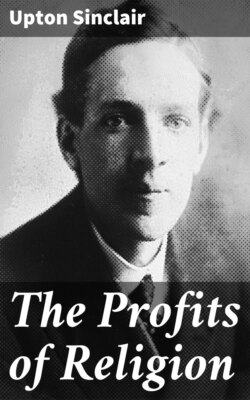Читать книгу The Profits of Religion - Upton Sinclair - Страница 6
На сайте Литреса книга снята с продажи.
RELIGION
ОглавлениеTable of Contents
The reader, offended by this raillery, asks if I mean to impugn the sincerity of all who preach the supremacy of the soul. No; I admit the honesty of the heroes and madmen of history. All I ask of the preacher is that he shall make an effort to practice his doctrine. Let him be tormented like Don Quixote; let him go mad like Nietzsche; let him stand upon a pillar and be devoured by worms like Simeon Stylites—on these terms I grant to any dreamer the right to hold himself above economic science.
Man is an evasive beast, given to cultivating strange notions about himself. He is humiliated by his simian ancestry, and tries to deny his animal nature, to persuade himself that he is not limited by its weaknesses nor concerned in its fate. And this impulse may be harmless, when it is genuine. But what are we to say when we see the formulas of heroic self-deception made use of by unheroic self-indulgence? What are we to say when we see asceticism preached to the poor by fat and comfortable retainers of the rich? What are we to say when we see idealism become hypocrisy, and the moral and spiritual heritage of mankind twisted to the knavish purposes of class-cruelty and greed? What I say is—Bootstrap-lifting!
It is the fate of many abstract words to be used in two senses, one good and the other bad. Morality means the will to righteousness, or it means Anthony Comstock; democracy means the rule of the people, or it means Tammany Hall. And so it is with the word "Religion". In its true sense Religion is the most fundamental of the soul's impulses, the impassioned love of life, the feeling of its preciousness, the desire to foster and further it. In that sense every thinking man must be religious; in that sense Religion is a perpetually self-renewing force, the very nature of our being. In that sense I have no thought of assailing it, I would make clear that I hold it beyond assailment.
But we are denied the pleasure of using the word in that honest sense, because of another which has been given to it. To the ordinary man "Religion" means, not the soul's longing for growth, the "hunger and thirst after righteousness", but certain forms in which this hunger has manifested itself in history, and prevails to-day throughout the world; that is to say, institutions having fixed dogmas and "revelations", creeds and rituals, with an administering caste claiming supernatural sanction. By such institutions the moral strivings of the race, the affections of childhood and the aspirations of youth are made the prerogatives and stock in trade of ecclesiastical hierarchies. It is the thesis of this book that "Religion" in this sense is a source of income to parasites, and the natural ally of every form of oppression and exploitation.
If by my jesting at "Bootstrap-lifting" I have wounded some dear prejudice of the reader, let me endeavor to speak in a more persuasive voice. I am a man who has suffered, and has seen the suffering of others; I have devoted my life to analyzing the causes of the suffering, to find out if it be necessary and fore-ordained, or if by any chance there be a way of escape for future generations. I have found that the latter is the case; the suffering is needless, it can with ease and certainty be banished from the earth. I know this with the knowledge of science—in the same way that the navigator of a ship knows his latitude and longitude, and the point of the compass to which he must steer in order to reach the port.
Come, reader, let us put aside prejudice, and the terrors of the cults of the unknown. The power which made us has given us a mind, and the impulse to its use; let us see what can be done with it to rid the earth of its ancient evils. And do not be troubled if at the outset this book seems to be entirely "destructive". I assure you that I am no crude materialist, I am not so shallow as to imagine that our race will be satisfied with a barren rationalism. I know that the old symbols came out of the heart of man because they corresponded to certain needs of the heart of man. I know that new symbols will be found, corresponding more exactly to the needs of our time. If here I set to work to tear down an old and ramshackle building, it is not from blind destructfulness, but as an architect who means to put a new and sounder structure in its place. Before we part company, I shall submit the blue print of that new home of the spirit.
